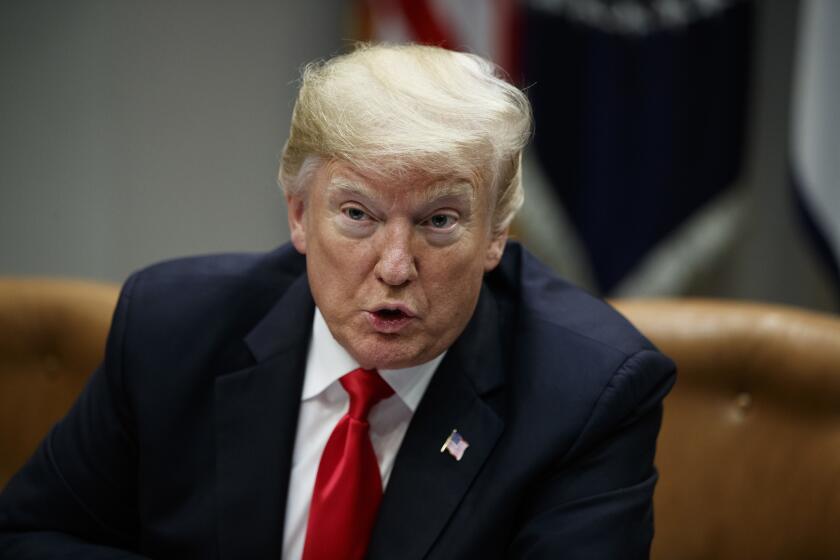Why Trump’s WeChat ban could hurt Hollywood’s ties to China

- Share via
For many Hollywood companies with ties to China, WeChat is the indispensable link to the country’s 1.4 billion people.
The app, owned by Shenzhen-based Tencent, is essential to daily modern life in China. It’s a digital payment service, social network and a messaging service all in one — used for everything from buying tickets at Shanghai Disneyland to negotiating brand deals worth hundreds of thousands of dollars. Few even bother to trade old-fashioned phone numbers: They stay in touch with WeChat accounts.
So when President Trump signed an executive order this month barring U.S. firms from transactions over WeChat starting Sept. 20 because of purported national security concerns, that left some entertainment executives and investors scrambling to find an alternative. U.S. businesses, including Disney and Apple, voiced their concerns in a call with White House officials last week, according to the Wall Street Journal.
“Every American who does business in China is about to wonder how they are going to be in touch with people in China,” said a talent manager who negotiated nearly $1-million worth of deals over WeChat last year between American celebrities and brands.
“I don’t have phone numbers. I don’t have email addresses. I just have WeChat — that’s the norm,” said the manager, who declined to be named, citing the potential impact on his business relationships.
Severing WeChat from U.S. businesses could suddenly cut off many from their Chinese contacts.
Kevin Zhang, a partner at Santa Monica-based Upfront Ventures, said he has nearly 500 connections on WeChat.
“It really is a kind of critical tool that you need to work with any Chinese partners, distributors, investors, etc.,” he added.
For swaths of the U.S. with concentrated Chinese populations, WeChat is a way of life. President Trump’s executive order banning the app could upend that.
Hollywood has increasingly looked to China as a major source of growth and cutting off the main communication tool could cause problems for large and small companies. Disney, for example, has invested heavily in its theme parks in Hong Kong and Shanghai and in promoting its wide array of movies in the country.
U.S. studios also use WeChat as a platform to market big movies in the world’s second-largest box office market, which accounted for $9.2 billion in ticket sales in 2019. Because film releases are tightly controlled by the Chinese government, foreign studios work with local distributors, such as Alibaba, to market and distribute movies.
WeChat is often part of the campaigns, allowing markers to send promotions directly to moviegoers. Such tactics are doubly beneficial because virtually all movie tickets are bought online in China, and radio and TV advertising is largely a nonfactor.
Complicating matters is that Hollywood was already facing headwinds in China because of the escalating trade war with the U.S. In another headache, China tightened censorship of foreign films by eliminating the regulatory body that traditionally oversaw entertainment in 2018 and shifting control to the Communist Party’s propaganda department.
Moreover, some experts worry Trump’s ban on WeChat and TikTok could lead to further retaliation by China against U.S. companies. Hollywood insiders expressed similar concerns as Trump administration officials and allies such as Atty. Gen. William Barr stepped up attacks on Hollywood for kowtowing to China’s demands to alter its content.
Representatives from Disney did not respond to requests for comment.
WeChat launched in 2011 and is China’s No. 1 messaging app, according to San Francisco-based mobile research firm Sensor Tower.
Unlike the U.S., in China, it’s more common to communicate with businesses through WeChat instead of email, because many Chinese people don’t own computers and get the internet through their cellphones, Zhang said. Messaging through WeChat is also free, compared to charges racked up by texting foreign numbers, he added.
There are no good alternatives that could fill a void left by a ban on WeChat. Facebook-owned WhatsApp does not operate in China. Encrypted messaging app Signal is rising in popularity but still ranks 136 in China in the social networking category, for free iPhone apps, compared to WeChat, which ranks first, Sensor Tower said. VPN is also an option but presents a hassle for Chinese businesses looking to get around China’s firewall.
“I can’t even think of an app off the top of my head that you could use to transition over because pretty much every single nonlocal communication app is banned in China,” Zhang said. “It’s inconvenient.”
Trump’s executive order bans transactions from Tencent’s WeChat with U.S. companies and individuals starting on Sept. 20. The president raised concerns about the app’s collection of data could get into the hands of the Chinese government and that WeChat could be used to track Chinese nationals visiting the U.S.
“The United States must take aggressive action against the owner of WeChat to protect our national security,” Trump wrote in the order.
The social video app faces growing scrutiny from the U.S. government, rising competition from rivals like Facebook and the defection of top creators.
But the wording in the order is vague and broad, and it’s unclear if companies could be in violation if they use WeChat for messaging, for promoting their products or services, or accepting payments, legal experts said.
“What companies like, especially when they’re operating overseas, is as much certainty as they can get,” said Carl Tobias, a professor at University of Richmond’s School of Law. “This is nothing if not unclear and breathes uncertainty. It seems in some ways, it’s going to be counterproductive, because it’s going to shut down certain practices — the back and forth between the two countries.”
Studios expect to receive more guidance from government officials clarifying what the executive order means for their businesses in about a month, said one person familiar with the matter who was not authorized to comment.
Tencent executives said in an Aug. 12 earnings call with investors they believe the order only affects WeChat and not Tencent’s other businesses in the United States or advertising done on WeChat in China.
“We are in the process of seeking further clarification from relevant parties in the U.S.,” said John Lo, Tencent’s chief financial officer on the earnings call.
Trump has also signed executive orders targeting China-based ByteDance’s streaming video app TikTok. One of them required ByteDance to sell its TikTok U.S. operations by Nov. 12.
The orders have caused panic among video creators who make money through brand deals on TikTok and raised fears among employees that their paychecks may be frozen on Sept. 20. On Monday, TikTok sued the Trump administration in federal court, alleging the proposed ban is unconstitutional.
The president is also considering action against other Chinese companies like Alibaba, which raised the issue in its earnings call last week.
“Today, we face uncertainties from not only the pandemic but also increasing tensions between US and China,” said Alibaba chief executive Daniel Yong Zhang. “We are closely monitoring the latest shift in US government policies towards Chinese companies, which is a very fluid situation.”
Changes in how U.S. companies conduct business in China could have an overall chilling effect on deal making.
“If [WeChat] is not allowed, and all of our European and Japanese and Chinese competitors are allowed to proceed merrily, then we will be held at a disadvantage,” said Craig Allen, president of US-China Business Council.
Some business leaders say the risks of doing business in China are necessary to gain access to one of the world’s biggest markets.
“As a company, you’re always thinking about worst case scenarios ... to plan for the fact that things may be monitored when they’re in China, whether that be via WeChat or anything else,” said Eden Chen, chief executive of Manhattan Beach-based Fishermen Labs, which provides augmented and virtual reality experiences.
In the past, Chen says he’s discussed deals worth $50,000 to $100,000 on WeChat for Fishermen Labs. Sometimes a deal could close in two days over the messaging app. Now, people are asking him on WeChat to move their conversations elsewhere.
President Trump’s escalating trade war with China poses clear risks to the global economy and growing political risks for his 2020 reelection bid.
At a news conference earlier this month, Trump stood by his executive order against WeChat when asked about U.S. business concerns.
“We’re going to do what’s good in terms of the security of our country,” Trump said. “We’ve been very badly let down by China.”
The Chinese government hasn’t retaliated but voiced its concern.
“It just cuts lines of communication which are really valuable,” said Marshall Meyer, professor emeritus at University of Pennsylvania’s the Wharton School, of the potential WeChat ban. “That would be my real worry is that they cut off all the Chinese apps and then people who really want to engage with China or in China are at an enormous disadvantage.”
More to Read
Inside the business of entertainment
The Wide Shot brings you news, analysis and insights on everything from streaming wars to production — and what it all means for the future.
You may occasionally receive promotional content from the Los Angeles Times.














